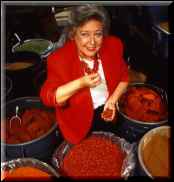The World of Spices

 In this column, Ann gets right to the flavor of the topic, so . . . . . take notes! With no further adieu, we turn the mike to Ann. You're on Ann . . . . .
In this column, Ann gets right to the flavor of the topic, so . . . . . take notes! With no further adieu, we turn the mike to Ann. You're on Ann . . . . .
Thanks Charlie,
Storing Herbs n' Spices
 Whole spices retain their flavor indefinitely. The flavor and aroma of spices begins to deteriorate once ground. We are all aware of the significant difference between freshly ground pepper and pepper which has been ground for even a few days. This difference is true of all spices to a more or less degree. Unfortunately each product deteriorates at a different rate with ground Cardamom losing its flavor in one week's time while ground cinnamon will stay fresh and fragrant for six months or more. The differences are caused by the different amounts of oil in each product. Oil, like fat delivers flavor and once product is ground the oil will dissipate.
Whole spices retain their flavor indefinitely. The flavor and aroma of spices begins to deteriorate once ground. We are all aware of the significant difference between freshly ground pepper and pepper which has been ground for even a few days. This difference is true of all spices to a more or less degree. Unfortunately each product deteriorates at a different rate with ground Cardamom losing its flavor in one week's time while ground cinnamon will stay fresh and fragrant for six months or more. The differences are caused by the different amounts of oil in each product. Oil, like fat delivers flavor and once product is ground the oil will dissipate.
Freshly ground nutmeg is a far cry from nutmeg, ground. Unless it is totally impractical, never buy ground nutmeg. Small nutmeg graters with a storage compartment for one or more nutmegs are cheap and easily found in cookware shops. There are also nutmeg grinders similar to pepper grinders, but they are relatively expensive ($25 to $30) and I find them difficult to use.
Some spices are so difficult or dangerous to grind that they should always be bought already ground. Chilies fall in to this category. We no longer grind chili powder in house because, even though we required our employees to wear gloves, safety glasses and mask when grinding chilies we found they inevitably ended up coughing. Fortunately chilies retain their flavor and heat fairly well for six to ten, months.
Herbs also loose flavor and aroma as they age. We sell only whole leaves, which help to retain their flavor. Furthermore when we mix seasonings we use tumble blenders, rather than ribbon blenders to avoid breaking the leaf. Again, as soon as herbs are crushed or cut the oils dissipate and the flavor disappears.
Keep herb and spice containers tightly closed and away from light or heat. Tins are probably the best way to keep spices because obviously they are air and light tight.
Most people prefer glass bottles with tight fitting caps. These bottles have the advantage of being able to have either caps or fitment with openings for sprinkling or spooning spices into your cooking.
Jeff Smith, the TV cook, says corks allow spices to breathe and therefore keeps them fresher longer. The disadvantage is that there is no way to have a both a fitment and a cork. For my own use I seem to have both caps and corks. I keep my spices on a turntable in my cupboard so light is not a problem.
There is a controversy about freezing spices. Ann Willan of La Varenne cooking school in France says she keeps her herbs and spices in the freezer but Julie Sauni, the noted Indian cook book writer, says freezing takes the edge off of the flavor. I have no personal knowledge about freezing. If you have experience with freezing spices I would like to hear from you about how this effects flavor.
To test for freshness, use your nose. The aroma of herbs and spices is the most important determinant of freshness. When the aroma is not strong, fresh, and fragrant get rid of them. If you do not realize the importance of fragrance remember how tasteless food is when you have a cold.
Most spices are picked ten to twelve months of the year so getting fresh products should not be a problem as long as you buy from small spice houses which turn over products frequently.
Finally, always buy herbs and spices in usable amounts. Buy whole and grind them yourself where practical. Throw products away when they lose their aroma. Since oil delivers flavor ask your spice supplier about oil content. Pay attention to aroma and flavor.
Copyright (c) 2000, by:
Ann D. Wilder, President
VANN Spices, Ltd.
More of Ann's Flavorful Topics!
'World of Spices' is © by VANN Spices, Ltd.
who is solely responsible for its content. |